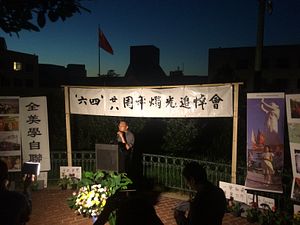In the late evening of June 3, the 28th anniversary commemoration of the 1989 Tiananmen Square Incident was held right in front of the Embassy of China in Washington, D.C., just as the many past commemorations.
Together with a dozen of other speakers, Wei Jingsheng, a veteran Chinese human rights activist, made a speech during the commemoration. He said:
We held commemorations here every year. Many people asked me: what’s the point? I said it’s very meaningful. And we should keep doing this, because we are showing the whole world that we haven’t forgotten the day; the day that so many young people sacrificed themselves for freedom and democracy, and for a better life for the next generations in China.
Yet, after 28 years, many Chinese nationals, the young generation in particular, don’t seem to care: no more than 50 people attended the commemoration and young people were much fewer. Even the event’s organizers couldn’t help but ask: why did so few people show up this year?
It is likely that most Chinese young people don’t even know about the 1989 Incident, after 28 years of information control and purposeful oblivion.
The Chinese authorities have been systematically deleting all non-governmental information related to the Tiananmen Incident. In order not to arouse too much curiosity among the young, the government accepted narrative contains very limited information:
On June 3, 1989, the month-long unrest created by an extreme small number of people in Beijing developed into counter-revolutionary riots. The martial law forces stationed around the city were ordered to quell the riots. In the morning of 4th, the martial law forces cleared Tiananmen Square and quelled the riots.
In the internet era, free information exploded, but the Chinese censors have always been able to keep up with technological development. With the Great Firewall built, local information deleted, and foreign information blocked, everything is under perfect control.
This year, as the anniversary approached, all the dissidents in China were either under guard or temporarily detained by the police, as a routine precaution. And the micro-management of information control was raised to a new level.
On Weibo, the Chinese equivalent of Twitter and one of the most active social networking services, the search results for “64” (stands for June 4) and “89” ( stands for 1989) have long become sensitive combinations that could never be displayed. But this year, even “73” — a secret code people made up to represent 6489 — was also added to the blacklist, according to “the relevant laws, regulations, and policies” which are never explained. Also on Weibo, any account with a foreign IP address was forbidden to post pictures, videos, or comments with pictures until the end of June 5, in the name of “system updates.” When some young netizens commented on a question about why they couldn’t post pictures during the period, the question was soon deleted before it could attract much attention.
Despite the comprehensive control of information, a small number of people in China still commemorated the anniversary in their own covert ways.
Some reposted Chinese President Xi Jinping’s speech on Japan’s invasion of China: “Forgetting history is a betrayal, and denying a crime is to repeat a crime.” Some quoted the words of Lu Xun, a leading figure of modern Chinese literature: “The lies wrote in ink can never cover the facts written in blood.” And some shared a song by Li Zhi, an underground singer-songwriter: “People don’t need freedom; it’s the best era.”
Whether the Chinese people need freedom or not, the war of memory and oblivion has been repeated for 28 years and it seems set to continue in the future.

































